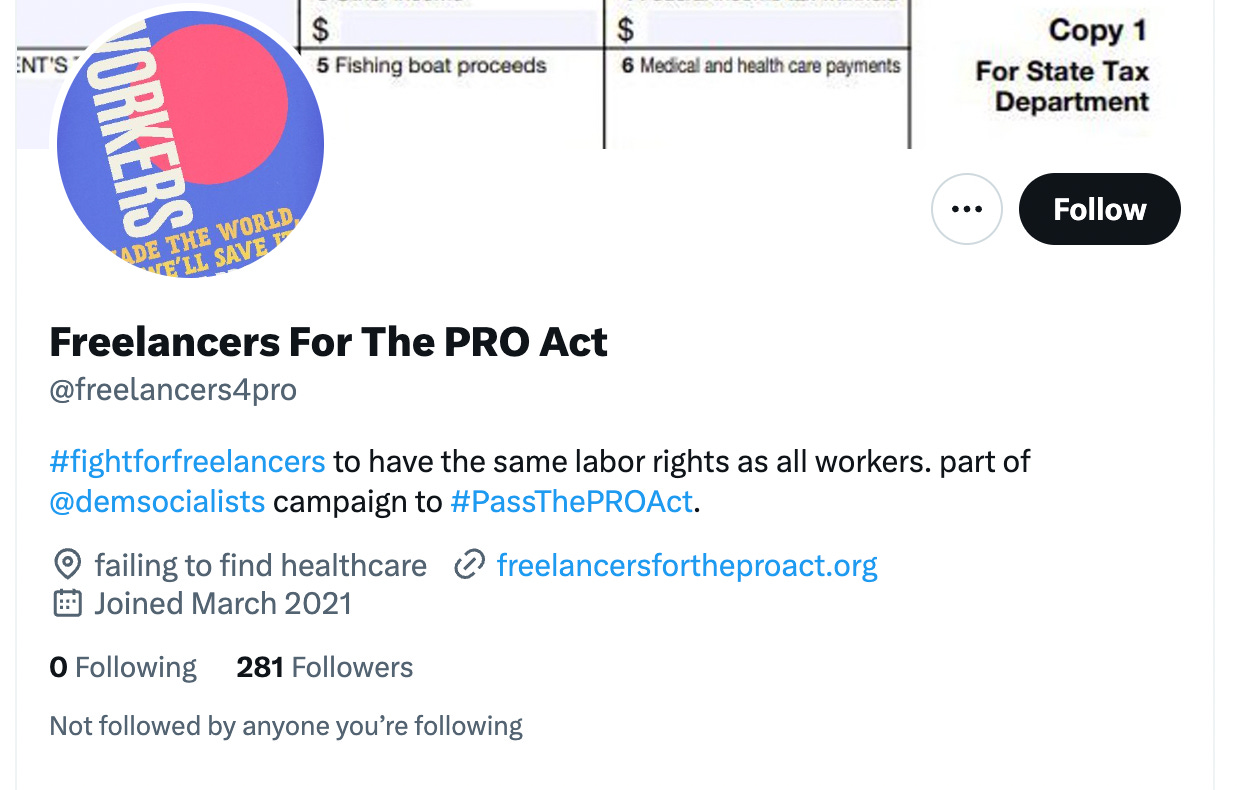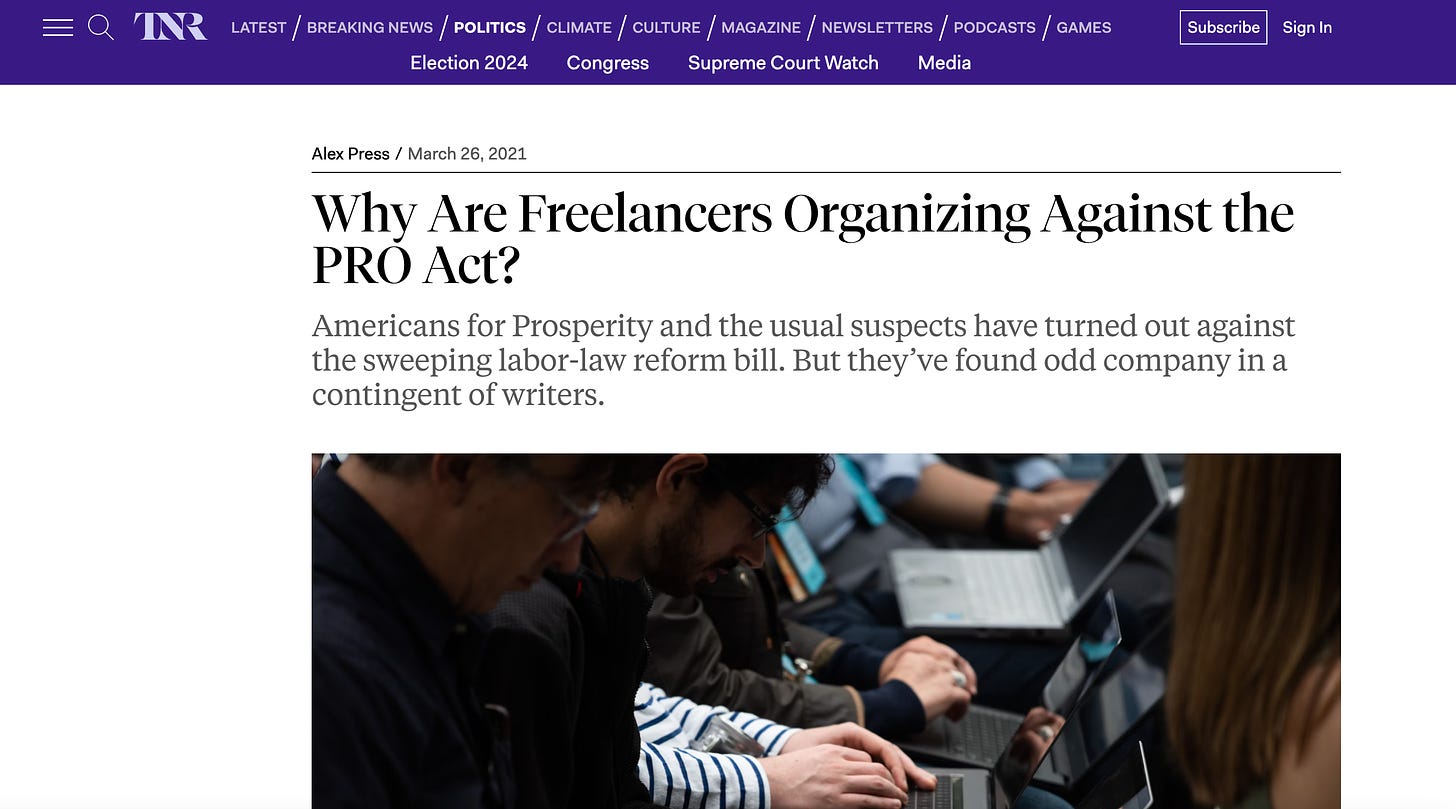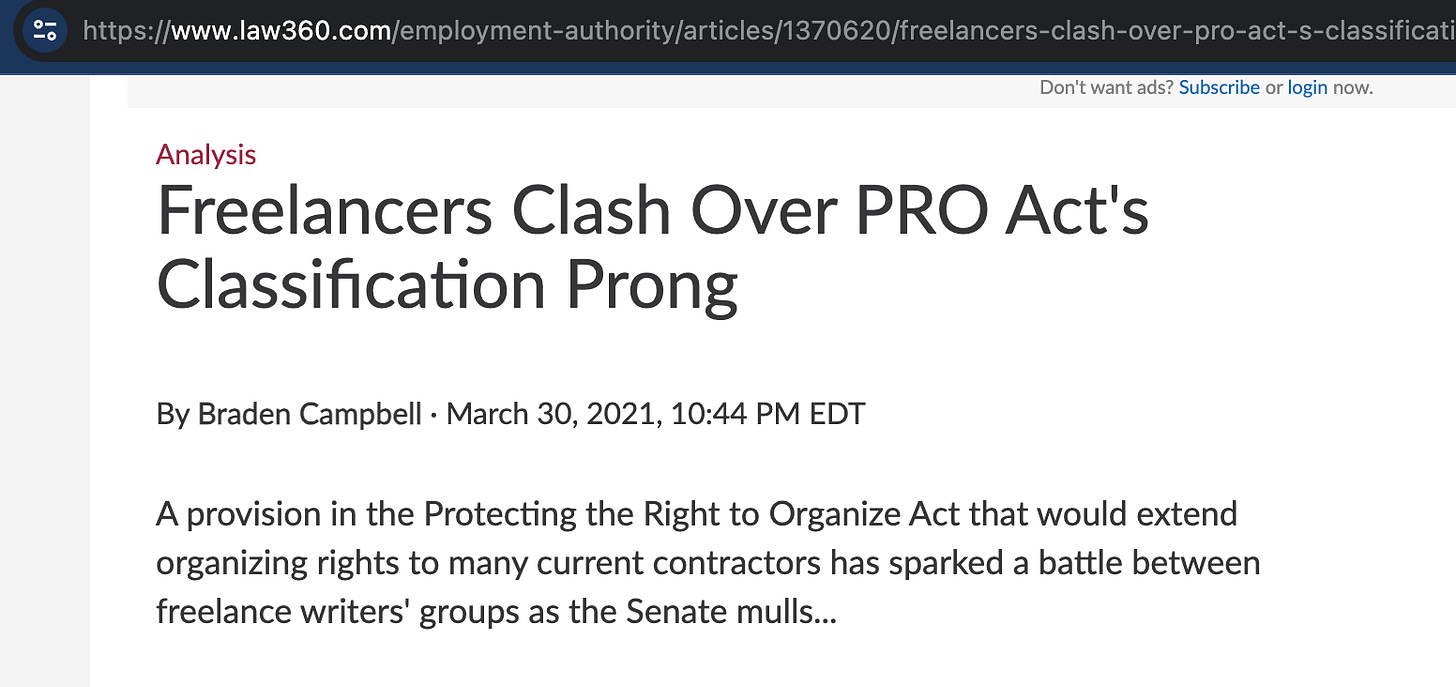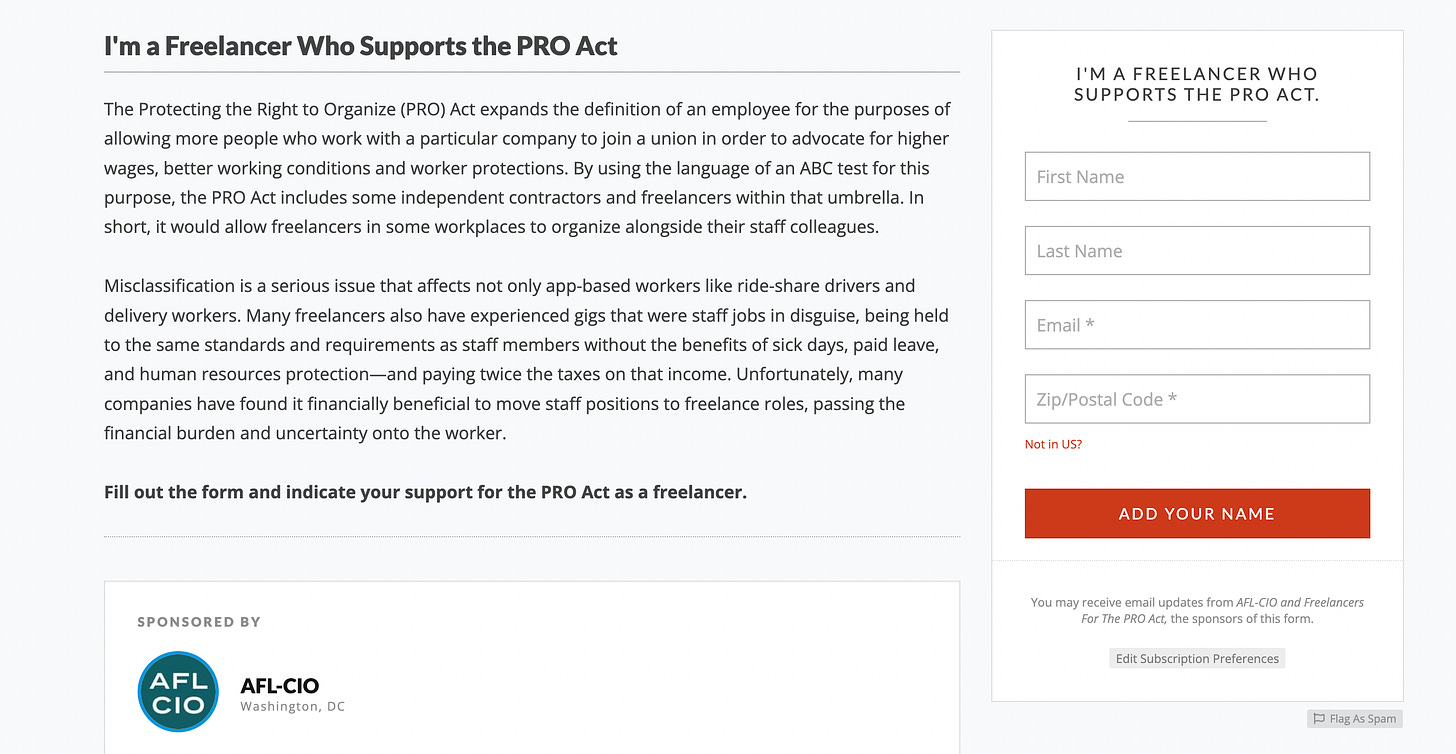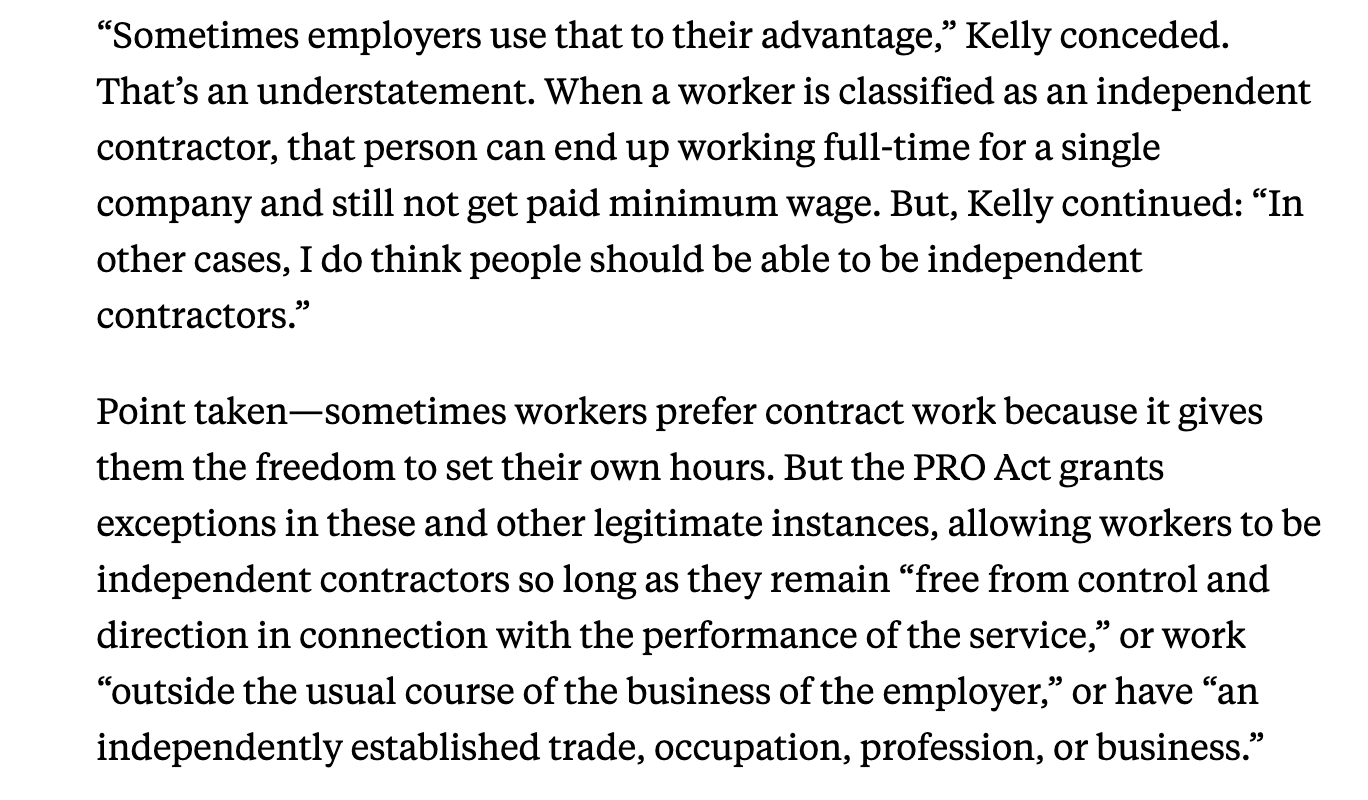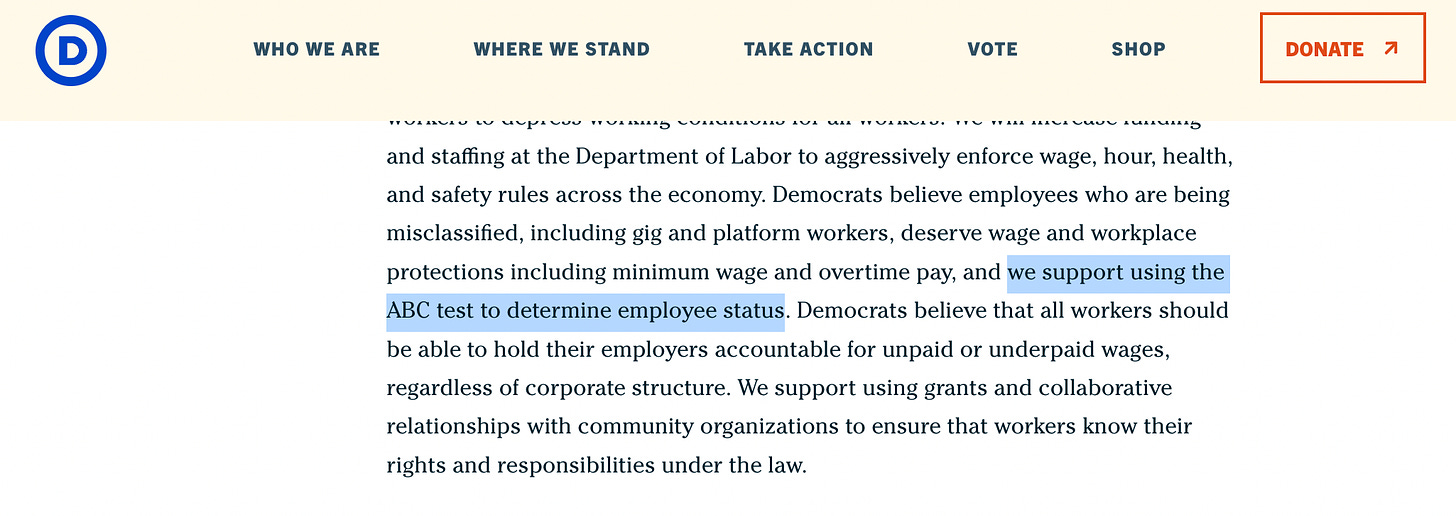The Dark Arts
Freelance-busting regulatory language that's specifically intended to restrict independent contractors is being rebranded as a list of "exceptions" to protect us.
It would be pretty darn amazing to have a crystal ball that could predict the future.
Short of that, those of us who are trying to stay one step ahead of the freelance-busting brigade can follow a handful of publications that give us hints about whatever might be coming next, before an idea hits the mainstream.
Bloomberg Law is a good title to read if you want to know the thinking of freelance-busters inside the federal government.
Law 360 tends to be early out of the gate with whatever spin the union bosses plan to throw at us next.
Then, there are a few publications where new freelance-busting language and ideas get floated for the general public’s consumption, like a test balloon.
One of those publications is The New Republic, and it dropped a real whopper this week.
Good Morning, Comrade
To understand how this kind of thing can work, let’s talk about The New Republic’s role in independent-contractor messaging back in 2021.
At that time, the Democratic Socialists of America were working with the AFL-CIO to try and pass federal legislation called the Protecting the Right to Organize Act. The PRO Act includes regulatory language—the ABC Test—that had destroyed the income and careers of legitimate independent contractors when it was implemented in California.
The Democratic Socialists and unionists wanted this ABC Test regulatory language imposed on everyone, nationwide. Our grassroots opposition was fighting to get the ABC Test removed from the PRO Act or, otherwise, block the bill altogether.
Our side had major momentum. Several fellow freelance writers and I had created a grassroots coalition called Fight For Freelancers that was gaining ground. A handful of Democratic senators had joined with Republicans and refused to co-sponsor the PRO Act. Two of them—Senators Mark Warner of Virginia and Mark Kelly of Arizona, had specifically said they did not want to see legitimate independent contractors harmed.
Freelance busters were frustrated that, in part because of our Fight For Freelancers coalition, the PRO Act did not have enough votes to pass.
Then, out of nowhere, a website appeared. It was called Freelancers for the PRO Act.
The people associated with it, calling themselves freelance writers, were unknown to any of us long-timers in the national freelance-writing community.
And this website looked, well, sketchy:
If you clicked around a bit, you eventually came to a page that showed who had built the site: the Democratic Socialists of America:
They had simultaneously created a handle on Twitter, too, since that was a platform where our grassroots opposition was strong. They put our hashtag, #FightForFreelancers, right into their bio and tried to co-opt our whole movement:
Note the date when that Twitter handle was created: March 2021.
At that same time, a flurry of articles started showing up almost daily in—you guessed it—The New Republic and some other media outlets.
This coverage elevated the Democratic Socialist voices and planted a narrative that there was disagreement within the freelance community about the PRO Act. The New Republic’s headline took a direct shot at our grassroots opposition:
Here was Law 360’s version, which ran just a couple days later:
My favorite was this version that appeared in that same span of days, on a self-described leftist-socialist show called “Good Morning Comrade”:
The AFL-CIO was part of this blitz, too. It tried to collect names of freelancers who would say they supported the socialist campaign for the PRO Act:
The AFL-CIO also hosted a virtual town hall, bringing together the Democratic Socialists with longtime freelance buster Rafael Espinal of the Freelancers Union (who, today, is working with the Teamsters on a new form of freelance busting):
It took us a minute back in 2021 to figure out what the heck all of this was.
We ultimately showed reporters and editors that these so-called freelance writers they were quoting did not seem to have any bylines, anywhere—which made it awfully hard for them to claim that they were freelance writers at all.
And then, as if by magic, the coverage and campaign stopped. In the press, on social media, everywhere.
It just vanished.
Poof.
You Mean Restrictions
Having lived through that experience, I now include The New Republic in the list of publications that I keep a close eye on whenever they write about the independent-contractor issue.
On Tuesday, the magazine published language that is notable, as well as laughable, to describe the freelance-busting ABC Test in the PRO Act.
The New Republic’s story joined a pile-on of other media coverage about how unionists do not want Vice President Kamala Harris to choose Senator Mark Kelly as her running mate. “His labor record is terrible,” The New Republic wrote.
In the section of the story about the PRO Act, The New Republic explained concerns that Kelly had expressed about the bill. Kelly had not specifically mentioned the ABC Test, but that’s what this section of the article is about. Kelly had rightfully acknowledged that sometimes, independent-contractor classification is misused to avoid things like paying employees the legal minimum wage, but that in general, Americans should be able to be independent contractors—an option that this overly restrictive ABC Test threatens:
The language that’s notable is this bit, from The New Republic’s writer:
“But the PRO Act grants exceptions in these and other legitimate instances…”
The three so-called “exceptions” for legitimate independent contractors that The New Republic then itemizes—free from control and direction, outside the usual course of business, and an independently established business—are in fact prongs A, B and C of the ABC Test.
These are not three “exceptions” to independent-contractor policy language.
These three lines are the ABC Test itself.
These three lines are the restrictions that unionists got into California law, and that, through the PRO Act, they want to use against independent contractors nationwide.
Real exceptions to this ABC Test do exist. In regulatory lingo, they’re usually called exemptions or carveouts.
The California Legislature, after imposing this ABC Test, ultimately exempted more than 100 professions from it, just so legitimate independent contractors could continue to earn a living.
That’s how destructive these three lines of regulatory language can be to legitimate independent contractors in all kinds of professions.
No such exemptions, exceptions or carveouts exist in the PRO Act.
Not a single one.
Testing, Testing
I’m still in search of a reliable crystal ball if anybody knows where to acquire one.
Until that happens, I’m watching to see if this “exceptions” language shows up anywhere else next.
A couple of other words are being simultaneously tested to try and reframe the narrative around restricting the right to choose self-employment—words like “protection” and “freedom” that come from the same old freelance-busting brigade, and that are now part of the presidential campaign.
This reframing is necessary because despite all the harm that this ABC Test has caused for legitimate independent contractors, Vice President Harris still supports imposing it nationwide. In fact, the Democratic Party has written the ABC Test right into the platform its candidates are promising for the country:
Supporting a policy that threatens the income and careers of tens of millions of legitimate independent contractors is a tough stance to defend. It’s arguably the dumbest campaign promise of all time to tell people that if we vote for you, then you’ll take away our right to hang out a shingle and go into business for ourselves.
“Freedom,” “protection” and “exceptions” sure do sound a whole lot nicer.
They’re magic words that can make the truth vanish.
Poof.







